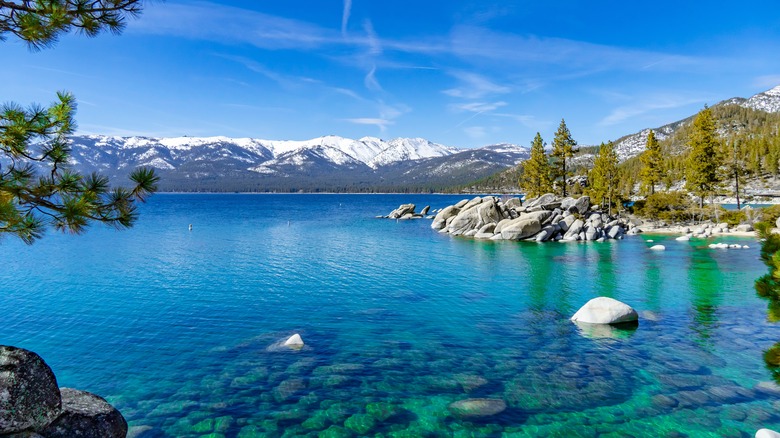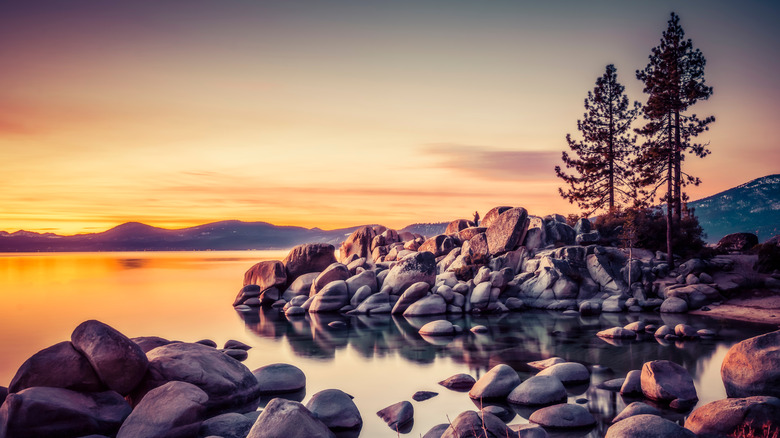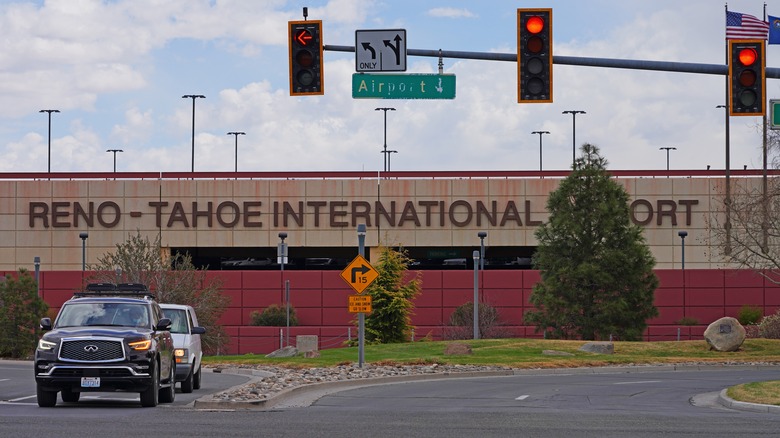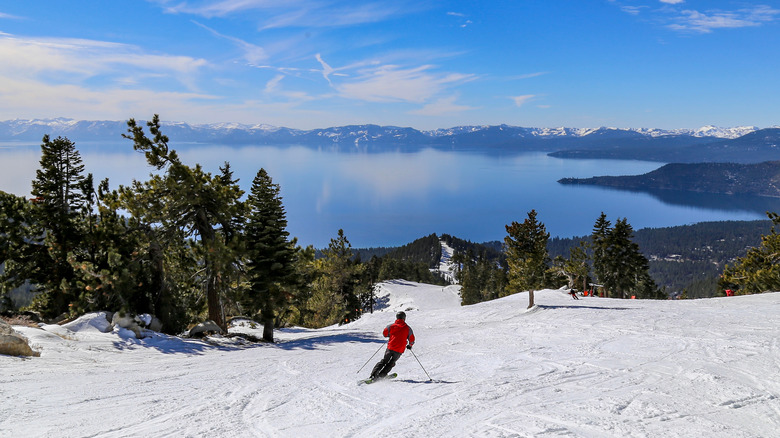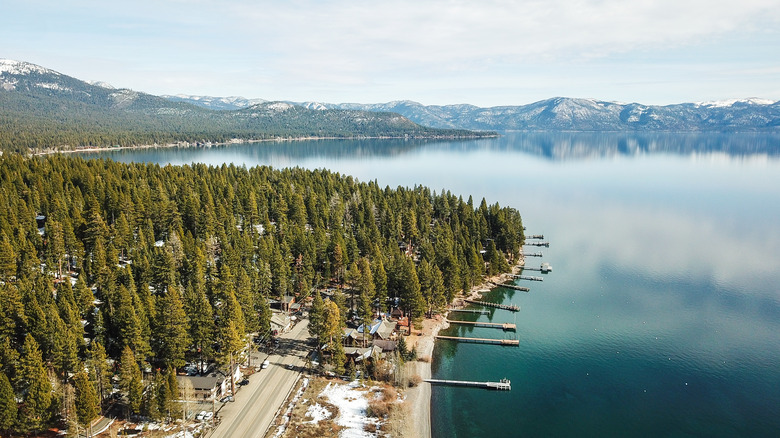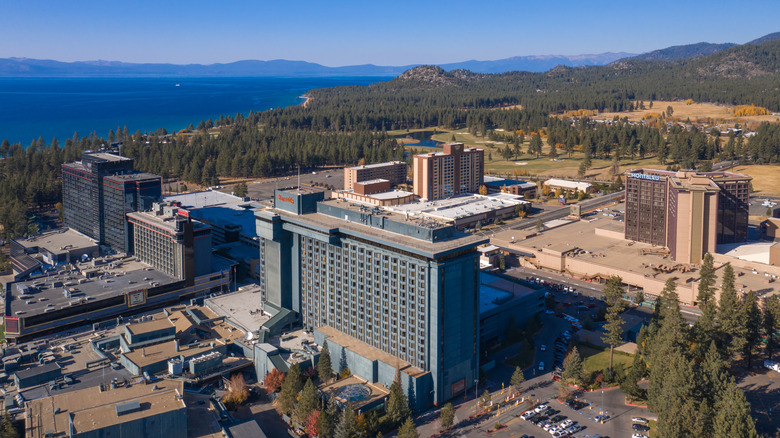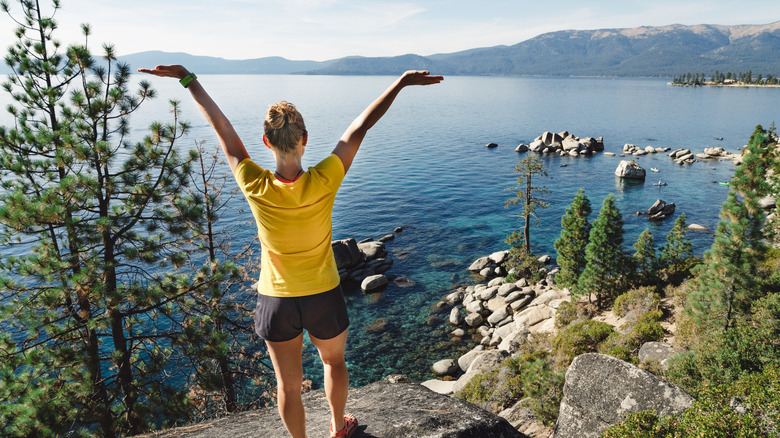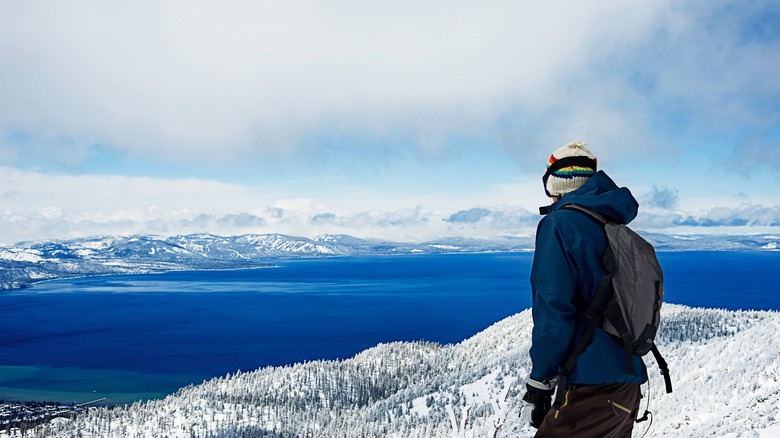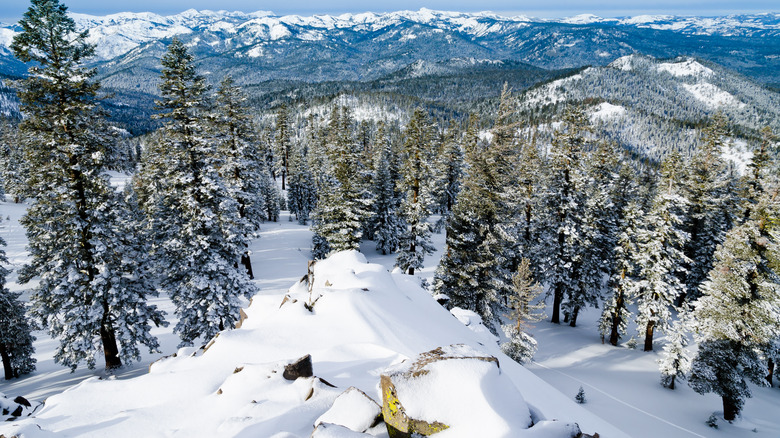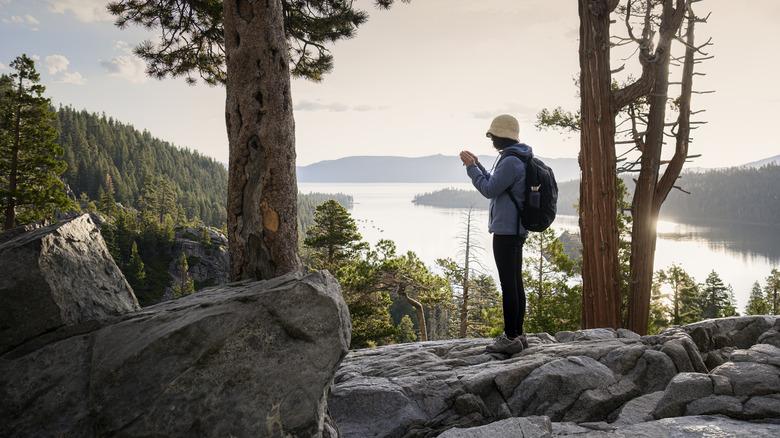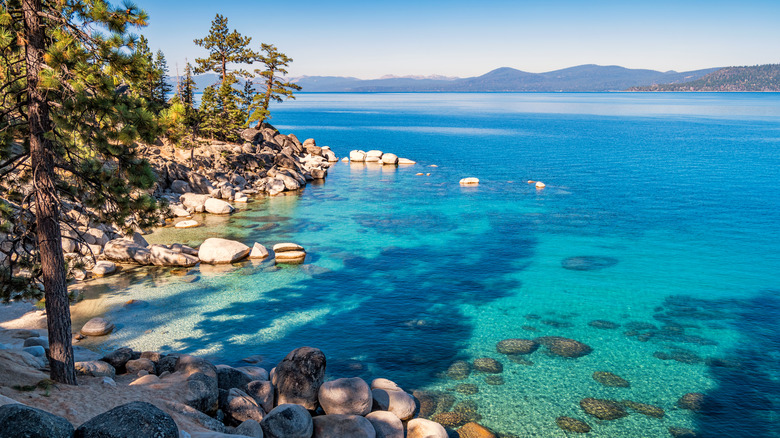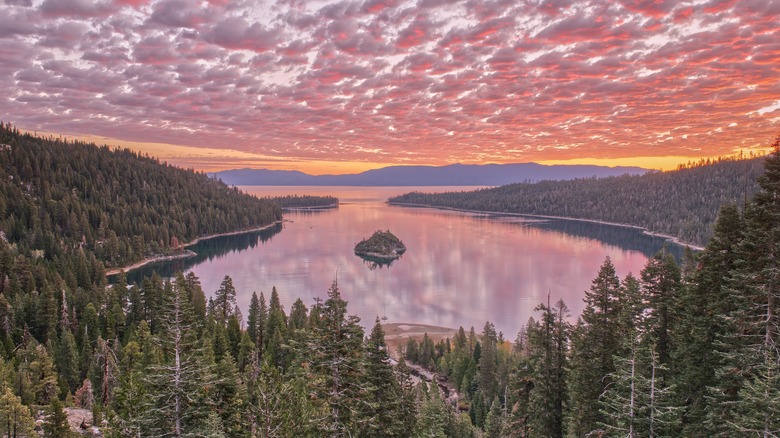12 Tips For Planning A Trip To Lake Tahoe
Lake Tahoe, which straddles the states of California and Nevada, might not be the largest lake in the country, but it is extraordinary. It is the biggest Alpine lake in the United States, bottoming out at more than 1,600 feet and with about 75 miles of shoreline. After Crater Lake in Oregon, it is also the deepest lake in the nation. As anyone who has laid eyes on it can excitedly attest, it's a place of immense natural beauty, with trees blanketing its shores and mountains around it in all directions. It also basks in clear, crisp air (it is located more than 6,000 feet above sea level, after all) and features water that is so blue that it will inevitably put the beholder under a spell.
That natural bounty has made it an attractive escape for vacationers looking for some outdoor time, and towns, cities, and ski resorts have sprung up around its rim, filled not only with happy vacationers but also people drawn by the scenic character of life in these parts. But visiting Lake Tahoe isn't as simple as just driving up on the spur of the moment and settling into your choice of accommodation. Whether it's your 1st time or 40th, going to Lake Tahoe requires strategic planning, especially in the peak seasons of summer and winter.
What to know about the lake
It doesn't matter where you see the lake from since your reaction will likely be the same — a lot of sighing and cooing in admiration and wonder. You might feel that what you are gazing at is too beautiful, too perfect to be real, that perhaps it's a dream from which you haven't woken, or a panorama compiled with the assistance of some CGI. But real it is, and while the lake is stunning all around, choosing the right bit of it can make or break your vacation. There are two main resort cities around Lake Tahoe (though, in reality, resorts and vacation homes spread everywhere by the lake). Incline Village is in the north, on the Nevada side, and South Lake Tahoe is in the south on the California side, bordered by the casino hub of Stateline, Nevada.
Outside these main centers, visitors will find smaller destinations, like the laid-back, old-feel town of Kings Beach, the tight-knit-community vibe of Tahoe City, the fine beaches and campground of Meeks Bay, and the luxury homes of Zephyr Cove. Incline Village and South Lake Tahoe have ski resorts, but, in general terms, the north end of the lake tends to lean a little quieter, while the south is where travelers will find the bigger resorts, livelier nightlife, and larger crowds.
How do you get there?
If one thing is beyond doubt, Lake Tahoe is very popular. Only about 50,000 people live around the lake, but Tahoe's rental units, hotels, resorts, and campgrounds welcome a staggering 2 million visitors yearly. What's more, the pandemic shone a light on the beauty of the lake as people sought refuge in areas of nature, places of great physical beauty, away from cities. The main gateway to Lake Tahoe is Reno-Tahoe International Airport in Nevada, located north of the lake. In terms of connectivity, 20 cities offer nonstops to Reno airport. In all, 12 airlines serve the airport, so flying here from anywhere in the country should be relatively straightforward.
Visitors who did not rent a car can catch a shuttle bus from the airport, either the North Lake Tahoe Express Bus or the South Tahoe Airporter, depending on where they are staying. Driving directly to Incline Village will take about 45 minutes, and to South Lake Tahoe, a little over an hour. Other airports are a little further away, with Sacramento Airport about two hours from the lake and the Bay Area approximately four hours away. Residents of these cities, of course, will just drive. Another option is to drop a pretty penny on a private charter directly to Truckee near North Tahoe or to South Lake Tahoe with Gary Air, with flights departing from the Bay Area and taking up to five passengers.
When should you go?
There is no bad time to visit Lake Tahoe, thanks to the activities and attractions available all year round and 300 days of sun per annum. The main driver of any decision for travelers is what they want to do when they arrive. If skiing is at the top of the list, then winter presents itself as the obvious choice. Summer is the most realistic option for swimming unless you have a very hardy constitution. The lake water is cold all year round; it is an alpine body of water, after all, but it's refreshing during the warm summer days when highs can hit the 80s.
Summer is suitable for other outdoor pursuits, like boating, hiking, and exploring; fall is also great for hiking, and that time of year also brings gorgeous autumnal foliage to the trees around the lake. For anglers, spring and fall are when the water conditions are optimal since the fish here tend to be more frisky in the cooler temperatures. These two seasons are also when to visit if avoiding crowds is your top priority.
During winter and summer, Lake Tahoe's main resort towns get very busy, and in the latter, the hiking trails and beaches fill so quickly that you need to get ready and out early. If you can't avoid the peak periods, just be prepared to encounter crowds. Whatever time of year you choose, consider returning in a different period; Lake Tahoe is not a one-season wonder.
Is it worth renting a car?
As with many destinations in the United States that are outside urban centers, rental cars are the best way to get from your accommodation to beaches, hiking trails, eateries, and more. The drawbacks of a car become evident during high season, when the traffic can be terrible, particularly at the lake's popular spots. Tourists will often park illegally or just sandwich their cars between others at the side of the road, even next to "No Parking" signs, such is the yawning chasm between legitimate parking spots and visitor numbers. The sad truth is that during high season, you will need to get up at the crack of dawn to locate an official parking spot. Travelers should be aware that such illegal parking can lead to fines and having their vehicle towed away, hardly a pleasant experience during a vacation.
There is a bus network around various parts of the lake under the auspices of Tahoe Transportation District, Lake Link, and the Tahoe Truckee Area Regional Transit. Still, depending on the route, there might only be a handful of buses daily, and their stops might not be convenient. In the winter, ski resorts also provide free shuttles, but this doesn't serve every single point around the lake. This leads us back to the bonus of renting a car. If you rent a vehicle in the winter, consider a four-wheel drive car for the snowy conditions and snow chains for your tires.
How to choose the right lodging?
As important as picking the part of the lake that will match your various demands, it is critical to choose the appropriate type of accommodation. The variety here is bewildering, and lodging options range from small inns to huge chain casino resorts — the Harrah's Lake Tahoe and Harveys Lake Tahoe, both in Stateline, Nevada, for example, have more than 500 rooms each. Beyond hotels, independent homes and condos are rented out on sites like VRBO and Airbnb. Some of the factors above will certainly help to narrow down your focus. If you did not rent a car, it makes sense to find a property close to shops and places to eat — somewhere like Heavenly Village in South Lake Tahoe — or in a large resort where everything is on-site, from food and beverage options to activities and amenities.
Budget will also play a significant role, as it may decide the type of place you can afford to stay. As a general rule, places that are physically nearer the lake or closer to ski runs will cost more. Rooms in luxury refuges like the Ritz-Carlton, Lake Tahoe, which has a full-service spa and a concierge for mountain activities, will also be pricier than one at the simple, unfussy Cottage Inn. Travelers should carefully decide what type of place they want — remote, quiet, centrally located, branded, independent, staffed, self-sufficient, and so on — and source the best option.
How can you save money?
For anyone looking for a budget holiday, Lake Tahoe might not be the place for you. This is not only due to supply and demand, with huge numbers of visitors outnumbering the actual people who like it year-round but also because it's a resort destination with gorgeous surroundings that has attracted many rich people. This influx was marked during the pandemic and helped to push up housing prices, although, truth be told, Tahoe wasn't cheap before that, anyway. There are, thankfully, ways to save money to help alleviate the sticker shock of pricey food, accommodation, gas, and more. Not driving is an obvious way to reduce costs and liberate you from the stress of parking, though you will sacrifice the benefits that a set of wheels brings.
Visitors can also consider staying a little away from the lake, like in the Californian city of Truckee, northwest of Lake Tahoe, and taking day trips to various points around the lake. When searching for travel dates, consider finding low-demand periods, such as the time between Thanksgiving and Christmas or shortly after the ski season ends, to get better room rates. Also, plan on booking your stay during the week, when demand tends to be lighter, though in peak seasons, demand is high every day. And forego boarding a boat or a kayak to see the scenery and take a hike instead.
What should you pack?
Given the altitude, Lake Tahoe is unlikely to get scorching, though once you are out and about, maybe taking a hike, you might quickly heat up. The weather can differ vastly between the lakefront, which sits about 6,000 feet above sea level, and the tops of the ski mountains, which can hit 10,000 feet. On the lake, temperatures range from well below freezing at night in the winter to the 80s in the height of summer. Even on a typical day, the conditions can quickly change on a whim, governed by fronts and air currents moving over the mountains.
The key to a comfortable trip to Tahoe is to pack the right clothing for the season and wear layers, whatever the time of year. In cooler seasons, fleece, vests, wool socks, and warm boots will all pay dividends. Even in the summer, having something handy that is warm is essential — nights in the summer can be chilly. Four other items must not be forgotten, whatever time of year visitors book a stay: sunblock, a hat, sunglasses, and some lip balm. The sun at this elevation is intense, so always wear sunblock outside, and since Tahoe's climate is dry, lips tend to chap quickly.
Will the altitude have an effect?
As mentioned earlier, Lake Tahoe sits at a high altitude, so there is less oxygen in the air than many of us are used to. Most people suffer altitude sickness at elevations of 8,000 feet or more, but the thinner air of Tahoe can also affect visitors. The symptoms of altitude sickness can include a headache or heavy head, feelings of nausea, your heart beating faster when doing simple things, vomiting, and a general sense of fatigue. These conditions don't usually persist ad infinitum but slowly dissipate once the body adjusts to the environment. Still, there are ways to minimize the effects or strategies that might help to alleviate the discomfort during the early days.
Consuming lots of water is one of the most effective ways to get your body in tune with the elevation; higher altitudes dehydrate you quicker, so aim to drink about a gallon a day. Start drinking extra water a week before the trip to ensure you are fully hydrated on arrival. Drinking less alcohol during your stay will also help. While the sight of the first lake might tempt you to get out and about to start activities, don't rush into exertion from the beginning but rather, let yourself adapt to the surroundings before hitting the slopes or the trails. Finally, consider what you eat, with carbohydrates and foods with high iron content becoming more important at altitude — both will help amplify your energy levels.
When is a good time to book?
When you look at the number of hotel rooms in South Lake Tahoe — 10,000 units — it might seem like a high figure, but visit in high season, and you'll realize it's not. These rooms are booked up early, sometimes a year in advance, but it's not only hotel rooms that seem to fill up at dizzying speed. Many other facets of Lake Tahoe's vacation life are in high demand, from restaurant reservations and spa appointments to activities on the lake and vacation homes to ski and snowboard rentals and more.
If you decide to visit Lake Tahoe, you need to choose your dates carefully and reserve everything well in advance. This is not the sort of destination, especially in high season, where you will find a wide range of lodging options a couple of weeks in advance, so plan as far as you can. This might seem like a trivial point, but believe us, it's not.
Will your phone work normally?
In an era when we are all increasingly slaves to our phones, it's hard to function daily without referring to those small screens. Smartphones aren't only where we get our information, how we stay in touch, and what we use for entertainment; they are also what we frequently use when navigating unfamiliar places. For travelers going to Lake Tahoe, a phone will be invaluable when getting directions to lodging or a lakefront outfitter, searching for restaurant recommendations, and trying to find the beginning of a trailhead. But you shouldn't plan on relying on your phone for everything in Tahoe because there are definitely dead spots in cellphone service around the lake.
While you might think this only happens at remote sections around the lake without many buildings or where nobody lives, some online forum users complain of dead spots even in built-up areas of South Lake Tahoe. The point is that you should prepare for lapses in signal — the exact locations vary, depending on your phone provider — and plan accordingly. Perhaps map out a driving route beforehand on paper (remember that?) or in your head, or on an old-fashioned atlas, note down physical addresses of places where you will be going or when the next bus will arrive.
Which beaches should you not miss?
The beaches around Lake Tahoe are achingly pretty all year, but summer is when they are most appealing, ready for you to jump into the water for a refreshing dip. Alas, summer is also when they will be at their busiest, but don't let that dissuade you from going to them since they are too beautiful to miss. Sand Harbor State Park, at the northeastern part of the lake, is one of the most picturesque bits of waterfront, where the water is so ridiculously clear that visitors will be able to easily see the rocks sitting on its floors and where the beach's entry into the lake is soft and gradual. It's great for a swim or kayak, with the rocky shoreline offering a pleasant contrast to the clear, still, blue water.
A short drive south of Sand Harbor is Secret Cove, where the scenery is magnetic, with large clumps of granite, stretches of sand, and gorgeous, inviting water, the foreground to mountains visible across the lake. For nude swimmers, this is also a popular haunt. Closer to South Lake Tahoe, Zephyr Cove Resort Beach is part of a resort but has public access and is a good spot for swimming, water sports, and even a cruise aboard a paddle-wheeler boat. On the west coast, Emerald Bay State Park has beaches that require a hike to reach, and there is an underwater park here with sunken vessels waiting to be explored.
Where can you get the best photos?
The word picturesque doesn't do Lake Tahoe justice, but thankfully, you can easily capture some of that pulchritudinous wonder in a few select spots. The beaches in the previous slide all promise fabulous shots, but Emerald Bay State Park stands out. The views from above — either from the lookout or along the Bayview Trail — take in the large bay, which opens and then narrows as it disappears into Lake Tahoe. Emerald Bay is also where you can find Vikingsholm, a small waterfront Scandinavian castle once a private summer home. Many granite boulders line the shores around Lake Tahoe, but Bonsai Rock is a showstopper, a giant slab almost like a clenched fist raised out of the water.
Mountain bikers like the Flume Trail not just for its challenging climbs but also for the stunning elevated views of the lake, sometimes seen between Aspen trees or other times open and unobstructed. The panorama from high up at Cave Rock State Park is also likely to take your breath away, with trees, the blues of the lake, and mountains all on view in one fell swoop. For a wide-open vista and incredible sunsets, head to Logan Shoals Vista Point.
